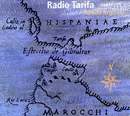Music |
Radio Tarifa
By
Published: Jun 12, 2018
Category:
World
“Rumba Argelina” is featured on the Guardian’s list of “1,000 albums to hear before you die.”
Rumba began life as African music. Slavery brought it to the New World, then back to Spain. The music of the Gipsy Kings is mostly the Spanish-based rumba flamenco — a passionate, raspy singer slams the lyrics against a pulsating flamenco melody. Radio Tarifa is far more subtle. "Rumba Argelina" means "Algerian Rumba," which suggests a blend of Spanish and African music that’s richer, quieter and, you’ll soon find, far more satisfying.
For those who have never been to Tarifa — that’s almost all of us — let’s break out our maps of Spain. It’s the end of the line — in ancient days, it was considered, literally, the end of the world. Just down the road from Gibraltar, it looks across at Morocco. You are invited to imagine that boats going back and forth carried more than fruit and contraband.
The concept of "Radio Tarifa" is that of a radio station — an imaginary channel you dial into at night. The air is warm. There’s a brisk wind off the water. The DJ — I see him wearing wire-rims and writing poetry and smoking cigarettes; he started doing this gig when his marriage ended — takes pride in his work. The music just….flows.
Here in America? Smoke curls from my fingers. There’s a glass of something by my elbow. The music begins, and so do the dreams. I’m in a cafe by the sea, in jeans and a white oxford shirt with the sleeves rolled up. Or I start there, then drift so far I can’t place where I am and how I got there. No matter: I’m both alert and relaxed, full of thoughts and fantasies that I don’t feel any need to write down. Yes, this is Trance Music. [To buy the CD from Amazon, click here.]
I saw them perform once in New York, and they were astonishing. First, the range of instruments: electric guitar, ney (Arabic flute), oud (Moroccan lute), oboe, soprano sax, bass, and a great variety of hand drums than I’d ever seen before. And then, the diverse kinds of music — flamenco, Arabic, Middle Eastern, jazz, rock, medieval chants in Latin, music, Oriental, German, Andalusian, Sephardic, Sanabrian — woven into a tapestry with universal appeal. And, finally, their sheer artistry. They know how good they are, they don’t need to show off.
There’s a bit of static on the CD sometimes, just to remind you of the radio concept. And once, between songs, the splash of small waves.
This music is exactly when connoisseurs mean when they speak lovingly of a "rare find."


